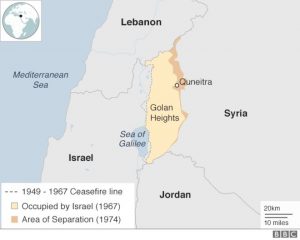This week Donald Trump hosted Israeli’s Prime Minister Benjamin Netanyahu and dropped another bombshell on the situation in the Middle East by recognizing Israeli sovereignty over the Golan Heights.
 Israel occupied the Golan during the 1967 war and has maintained control ever since, formally annexing the region in 1981. The BBC provide a fairly concise history of the region and explain its strategic importance here.
Israel occupied the Golan during the 1967 war and has maintained control ever since, formally annexing the region in 1981. The BBC provide a fairly concise history of the region and explain its strategic importance here.
Israel’s interest in controlling the Golan is essentially about maintaining military security and controlling the water resource including the Eastern shore of the Sea of Galilee. My guess is that very few analysts or political leaders really believed that Israel would ever hand back the region in its entirety to Syria but there have been hopes of some sort of compromise emerging.
By recognizing Israeli’s annexation of the Golan, albeit 38 years after the fact, the Trump administration has essentially taken away any possible leverage that could be used in the future with Israeli on this issue. His administration did the same thing last year by moving the U.S. Embassy officially to Jerusalem, essentially acknowledging the city as the capital of Israel.
In the declaration, which can be found here, Trump specifically mentions the threat poised by “Iran and terrorist groups, including Hizballah, in southern Syria” as the compelling reason for making the move at this point in time.
While it is clear that the Syrian government has lost its ability to control such groups in the chaos of the civil war and such groups do poise a threat to Israel. What is not clear to me is why the Trump administration felt it was necessary to make such a declaration as U.S. policy has been to support Israeli’s legitimate security interests since the founding of the country in 1948.
Like the ambiguous status of Jerusalem, which I discussed in another post at the time, the situation in the Golan has been stable since the last war in 1973. Israel is already monitoring the activities of Hizballah and Iran and in January took action to destroy Iranian missile batteries outside of Damascus.
The announcement in Washington has provoked a strong response from political leaders across the Arab world including close U.S. allies such as Oman and Saudi Arabia as reported by Al Jazeera and the Arab News. What is not clear is the depth of conviction of these complaints and whether they are only for public consumption or represent a serious blow to the administration’s plans for increased American involvement in the Arabian (or Persian) Gulf.

What seems most likely is that the timing of Netanyahu’s visit and the announcement concerning the Golan has more to do with Israeli and American politics than with regional peace and security.
Israeli holds elections on April 9th and Netanyahu is being challenged by a new centrist political party in Israel, the Blue and White Party, led by three former Generals and a celebrity journalist. Even after the announcement, the latest polls show Blue and White ahead of Netanyahu’s Likud party although either one of them will have an arduous task of building a coalition broad enough to actually form a government.
In the U.S., President Trump is dealing with the release of the Muller report. Fortunately for the President, it appears that the report has not found clear conspiracy to affect the election by him or his team although there is more confusion concerning the charge of obstruction of justice.
In any case the declaration concerning the Golan and Netanyahu’s visit has certainly served to change the subject or at least water down the media’s focus on the investigations and its conclusion that the Russian did interfere in the election and hand down indictments against 34 individuals 6 of whom worked for Trump’s campaign as reported by the Washington Post.
It seems to me that the announcement concerning the Golan Heights may not actually serves the national interest of either Israel or the United States and only that of its current political leaders.

